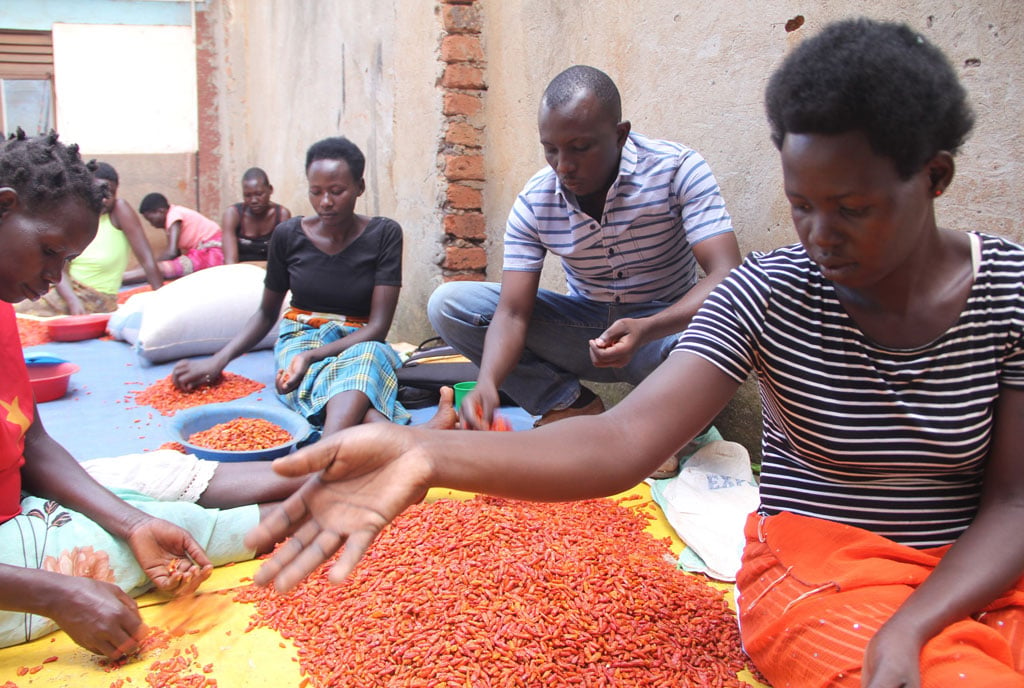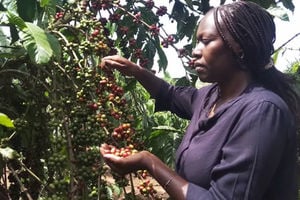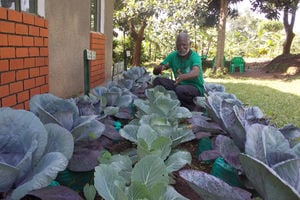
A farmer serves water to his pigs in Alango village, Kitgum Municipality in May 2023. For pig farming, tooth trimming is now prohibited. PHOTO/TOBBIAS JOLLY OWINY
The European Union Organic Regulation set to be rolled out on January 1, 2025, will contribute to protecting the environment and maintaining the long-term fertility of soils while safeguarding animal welfare standards.
The regulation, which seeks to encourage short distribution channels and local production in various European Union (EU) areas, has been welcomed with mixed feelings by Ugandan farmers.
The EU says the rules will encourage the preservation of rare and native breeds in danger of extinction and foster the development of organic plant breeding activities. This comes after the EU set ambitious targets in its environmental policy. The body of work in question includes the Farm to Fork Strategy (F2F) and European Green Deal (EGD) which set out to have at least 25 percent of European farmland run on organic land management practices by 2030.
According to the new organic production rule, to be a member of any grower group, the land growing size for each farmer must not be more than five acres. While the farmer must not have more than Shs60m of organic output per year, a grower group must have a maximum of 2,000 members and have a legal personality (registered).
What the rules mean
Out of the 2,000 members, up to 100 will need to be inspected by certified auditors, with inspection costs expected to rise from an average of €2,000 to €4,500. For Gulu Agricultural Development Company Ltd (GADC), which has around 30,000 smallholder farmer members, this means it will need to divide its membership into 15 separate groups to comply with the 2,000-member limit and maintain production.
Whereas GADC has previously been spending approximately €35,000 in annual fees, the new rules mean that each of the 15 groups will have to part with nearly €15,000 (approximately Shs61m).
“So, €15,000 times 15 groups—this is crazy. I don’t see how we are going to handle our clients,” Moses Oburu, the general manager of Vermipro Ltd, says, adding, “I see a big problem coming in January when the regulation enforcement begins.”
Of the €15,000 to be shouldered by each group, 30 percent of the costs will go to laboratory analysis. Mr Oburu says using “a laboratory accredited here in Uganda” would make sense. “Why should I pick a sample from Kampala and ship it to Rotterdam or Eurofins Scientific SE? Why can’t we have Chemiphar Uganda Ltd or Uganda National Bureau of Standards accredited to do such an analysis?”
The new regulation also encompasses the rules for organic production and the labelling of organic products.
This covers aspects such as production standards, certification, labelling, as well as advertising of organic food and feed. Replacing the 2007 version, the regulation applies to all organic products produced, processed, packed, or imported within the EU. It has been in force in the EU since January 2022, with a transition period for non-EU countries ending on December 31, 2024.
Reservations
Experts argue that there will be a huge estimated increase in costs for maintaining the EU organic certification. The variation is estimated to be nearly 200 percent. Little wonder, Dr Charles Waraga, an agricultural certification consultant, describes the new regulation as a “killer rule.” He predicts that it would result in commercial tensions and economic losses that farmers and producers would be unable to bear.
Experience shows that the larger and more integrated a producer is with the supply chain, the more likely complex compliance challenges can be overcome. Smaller producer groups are likely to lose out, Dr Walaga reasons, adding that many farmers and producers will be affected by the regulation and are likely to stop their organic certification and fall out of business.
“The biggest fraction of farmers are going to have terrible challenges of finding the resources for certification,” he says, adding, “Most farming projects, farmer groups run them on a total capital base of averagely €6,000 (about Shs25 million), and if certification alone is plus €4,000, you will not expect them to sustain the same market.”
Dr Walaga further notes that the new regulation is disastrous and will force majority of organic farmers out of production due to absence of better markets. “Majority exporters and farming groups are going to be kicked out because most of the produce we generate from smallholder farmers is brought together under cooperative societies and associations that bring together more than 5,000 farmers.”
Other side of the coin
While Margaret Laloyo, the director of Blessed Organic Release Ltd, with at least 10,000 farmer members in northern Uganda, says they are concerned about the negative effect of the new regulation of farming, she believes the regulation will help farmers and producers acquire quality products.
“We have had issues with farmers for a long time regarding quality assurance because in organic farming, there are no lies. You have to live up to the promise,” Ms Laloyo says. “It is an exciting opportunity for Uganda to come up with straight standards, so there are so many things that we have to analyse as actors in organic farming.”
The EU’s regulatory approach comes at a time when the Ugandan economy is struggling with strong headwinds due to a string of geopolitical issues (the pandemic, Russia-Ukraine war, etc.) and the ever-increasing costs to adapt to climate change. Mr Chariton Namuwoza, the chief executive officer of the National Organic Agriculture Movement of Uganda (NOGAMU), warns that the recent changes will significantly disrupt how farmers conduct their organic farming practices.
“There are some changes relating to the inputs they have been using and practices in terms of cover crops, including how the farmers are organised. For example, this time farmers will not be allowed to have a group that is more than 2,000 farmers, and this group must be legally incorporated,” Mr Namuwoza observed, adding that the new regulation leaves farmers at the mercy of the government due to the huge associated costs.
The NOGAMU chief executive urged the government to provide incentives to farmers and establish the necessary facilities, including laboratories. This is in a bid to ease certification and analysis associated with the new regulations.
“There is no single country that has ever flourished in agriculture without its government investing in it,” he notes, adding, “There have to be deliberate efforts by the government to invest in and support organic farming; without that, we cannot harvest the foreign incomes and prove our dominance of the foreign markets for organics.”
Mr Namuwoza says since Uganda has a rich global network, it should “position itself on the globe as a leader in organic farming because we have one of the most conducive climates and soils.”
Pool of opportunities
On August 21, a conference was held in Kampala, bringing together farmers, processors, exporters, input suppliers, and development partners. Organised by NOGAMU and the International Trade Centre of the United Nations (ITC), the event focused on assessing Uganda’s readiness to comply with the new EU regulations on organic exports.
Currently, the global organic market exceeds €100 billion. This rapid development has been partially attributed to a shift in consumer demand. Uganda is increasingly receiving recognition as a major player in the organic export market. However, with this increase, Mr Allan Wayira, the programme officer for the Star Project of the ITC, says there are pertinent strategies that need to be laid out to sustain Uganda’s exports to the EU and other alternative markets.
“Uganda has been flagged as one of the countries with risky exports, and some of the exports that have been greatly affected include oil seeds,” Mr Wayira disclosed, adding, “The new regulations bring substantive changes to the EU import system for all organic producer groups including farmers, processors, and traders.”
According to Mr Wayira, the regulations have the potential to greatly reduce Uganda’s current percentage increase of exports. This currently stands at 40 percent per a survey commissioned by NOGAMU organic statistics (2018-2021) and the Centre for Ecosystems Research for Development (CERD). Dr William Sendaula, an official from the Ministry of Agriculture’s (Maaif) Directorate of Animal Resources, says the new regulation is a blessing in disguise as it offers the country an opportunity to explore alternative markets that desperately yearn for organic products.
“We have potential markets outside there, so even when these policies seem stringent for us, there are some markets available to us that are not too tough for now, including the Gulf markets. Farmers and investors should now look to explore these additional markets if the EU is reigning hard on us,” Dr Sendaula opined. He cited a 2023 request from Qatar and Saudi Arabia, which called for a daily supply of 5,000 goats. He added: “After assessing Uganda’s goat population, we realised we couldn’t sustain that market for even six months.”
Dr Sendaula pointed out that China, despite its nearly two billion people, has only two dairy processing facilities, which produce enough to meet the needs of just 300 million people. “In Uganda, with nearly 16 million cattle producing 25 tonnes of milk daily, and less than a litre being utilised locally, China has a greater need for this milk than the EU,” he stated.
Mixed picture
While some certified producer groups in Uganda can meet the new EU “Group of Operators” definition, the majority of these certified groups will need to set up new legal group entities for EU certification.
This is principally because they are not legally recognised. Besides, producers believe that the procedures for residue testing before import into the EU are also quite cumbersome and need to be simplified.

Farmers sort red chilli before packaging them for export.
The EU is Uganda’s biggest market for organic farm produce and processed products to date, followed by the United States of America. The EU long required that an exporter presents a transaction certificate for every commodity before entering into its market. The US, under its National Organic Programme (NOP), also started enforcing the same at the beginning of 2024. Nowadays, an exporter of organic produce to the US will be required to present the same certificate issued by an accredited certification body from the product’s country of origin.
Dr Abubakar Muhammad Moki, the commissioner of Policy Development and Capacity Building at the State House (Office of the President), says logical reasons forced the EU to develop strict rules for trading organic agricultural products.
“We don’t need to lament. We need to understand the EU regulation in a more structured way; otherwise, we shall end up addressing only the signs and symptoms but fail to tackle the real problem,” he says.
So what issues was the EU trying to address by coming up with these regulations? Dr Moki says this is an important question to ask. He adds: “We must dig out the root causes, and after coming up with them, we then build solutions, and then we compare.”
While the regulation seems detrimental to the country’s organic crop production and exports, Dr Moki believes it will help the country address its increasingly poisonous food production practices. “Let’s see how we can find out from these European issues they are trying to address within this regulation.
We all eat the food but now most of the food we are eating is poisoned and nobody is sitting down to find out why we have reached that level. All the salad is full of chemicals; all the meat is full of antibiotics.”
Agricultural powerhouse
Uganda ranks as one of the major African producers and exporters of agricultural products, according to NOGAMU. Its products dominate the EU, USA, Japan markets, and other export destinations. It is also said to be Africa’s leading country with the highest (210,352) number of organic farmers, and ranks third after Tunisia and Tanzania with 262,282 hectares of land under organic production, representing 1.8 percent of total agricultural land.
Among the crop produce eligible for sale in the EU in either fresh or processed forms are those cultivated using organic farming methods. This excludes the application of chemical pesticides, synthetic fertilisers, and genetically modified organisms (GMOs).
They include fruits, herbs, vegetables, meat, dairy products, and poultry products, as well as processed drinks and frozen meals.
The projected growth is attributed to the increasing demand for major crops grown in the country, such as coffee, tea, cocoa, oil crops such as sesame, chia, and sunflower, fruits and vegetables, soybeans, herbs and spices, vanilla, chilli, ginger, shea butter, and cotton.
Already, there is demand for organically produced cereals, yams, sweet potatoes, cassava, pulses, and indigenous vegetables in the domestic market.
Organic agriculture contributes approximately 17.1 percent of the value of agricultural exports, which currently stand at $291.2 million per annum, according to the National Budget Framework Paper for the Financial Year 2017/2018.
Fair Trade International reports that the increased costs are due to the need to establish multiple smaller entities, adhere to the limit on the number of members, and cover the higher expenses associated with product sampling and residue testing.
“The new requirements entail a combination of legal adaptations, stricter production and management rules, and audit rules, in combination leading to higher costs for compliance, certification and higher risks of losing organic consignments due to residue testing results,” it adds.
Fair Trade International is a body that brings together thousands of producers and exporters across at least 150 countries globally, who trade in organic agricultural products to Europe.
Given the constrained lab accessibility and capacity in most third world (African) countries, the feasibility of providing the required residue test results before import into the EU is predicted to become a massive business risk for producers and exporters to the EU, it said in a June policy letter.
About the new rules
- The new European Organic Regulation (EU) 2018/848 introduces several significant changes to crop and animal production standards. For crops, any plant whose rootstock originates from a mother plant that hasn’t been organically grown for at least two growing seasons will be classified as inorganic.
- Additionally, the list of authorised inputs has been revised, with certain substances like wood vinegar, vegetable ashes, soybean oil, and ethylene in cultivation now prohibited for plant protection.
- Crop rotation requirements have also been updated to mandate the inclusion of leguminous crops as either a main or cover crop, along with other green manure crops.
- In livestock production, new regulations specify that only farms with fewer than 50 adult cattle are eligible for exemptions regarding cattle tethering. Furthermore, the final fattening phase of adult cattle for meat production can no longer be conducted exclusively indoors.
- For pig farming, tooth trimming is now prohibited. However, in regions where weather permits pigs to live outdoors year-round, they must have access to shelters or shaded areas to protect them from adverse weather, though buildings are not mandatory. l The new rules also ban the plucking of live poultry, but allow for debeaking within the first three days of a bird’s life under certain conditions.



